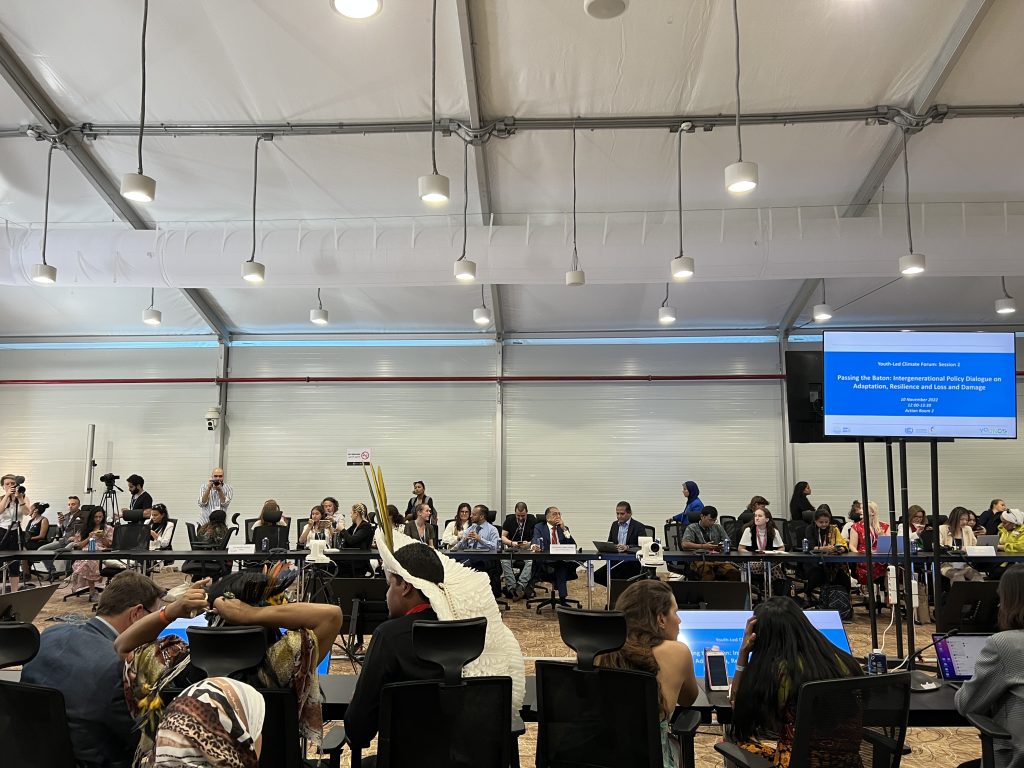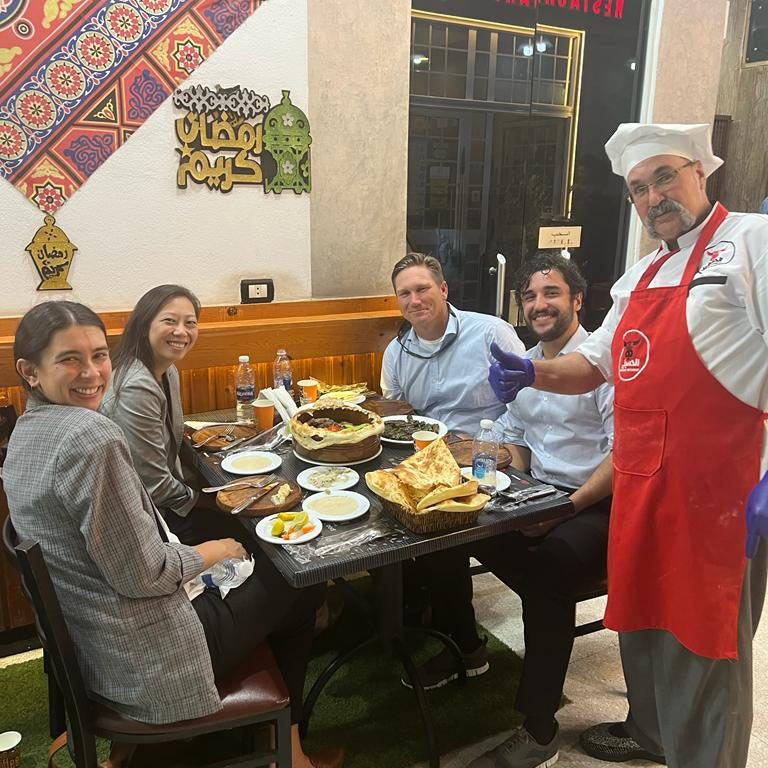
ELP Co-Director David Forman, Elizabeth Songvilay ‘23, Diego Rivera ‘23, former WSRSL Professor Shalanda Baker, Emily Sarasa ‘24, and ELP Co-Director Richard Wallsgrove at COP 27
This past fall, three Richardson Environmental Law Program students attended the 2022 United Nations Climate Change Conference (COP 27) in Sharm El-Sheikh, Egypt. The Conference represented a global effort to tangibly address and reach UN climate change goals.
Each student reflected on their experience:
“Attending COP 27 was an inspiring experience that strengthened my understanding of concepts I am learning about in my international environmental law course. For example, I had the opportunity to observe the process of decision-making at an international level Representatives voiced concern or support to advance their party’s interests regarding tense agenda items, like long-term climate finance. In International Law, we learned that while state sovereignty is a fundamental principle, climate change does not respect territorial borders. With so many different values and competing interests, reaching a consensus to combat climate change on the international level is a major undertaking that was fascinating to watch.
When not attending Conference meetings, I loved visiting the side-events and exhibits. I learned about the effects of climate change worldwide and the initiatives that individuals, NGOs, and governments are taking to address them. Some of the issues and solutions were especially relevant to Hawaiʻi. For example, Hawaiʻi imports 85-90% of its food, making our food supply particularly vulnerable to climate disaster. Through the Convention’s exhibits, I learned about strategies to support local farmers, embrace Indigenous food practices, and limit food waste. Implementing similar policies and practices here in Hawaiʻi would help create a more climate resilient food system.. These side-events made me hopeful that with civic action and commitment from the international community, we can mitigate and adapt to the worst effects of climate change.” – Emily Sarasa ‘24

“COP 27 was an unforgettable experience. I was most interested to see how people from around the world decide on climate change policies together. Although fascinating to watch, I observed that the official meeting discussions moved rather slowly because of the vast number of countries and perspectives in the room. Most of the action at COP seemed to actually occur outside of the official meetings. At any given moment, hundreds of policy discussions were being held.
It was amazing to hear people from around the world speak about how they have been personally impacted by climate change and how we can collectively work to help one another adapt. I was especially inspired by the Youth Constituency who brought fresh perspectives to discussions and lifted the voices of traditionally marginalized groups. The Youth Constituency reminded me that the next generation of leaders are eager and willing to address climate change and that each of us has a responsibility to help our own communities take action in the fight. Altogether, I found the entire COP ecosystem beautiful. While each delegate may not leave COP entirely satisfied, it is remarkable that the entire world has come together to address climate change. I left the Conference hopeful for the future. ” – Elizabeth Songvilay ‘23, EPT student

“I attended COP 27 with the opinion that the United Nations is a tool used to maintain the colonial status quo. Although the negotiations were the learning experience of a lifetime, I was more concerned with how Indigenous peoples viewed the Conference and all the procedures in place to stop the climate crisis. While Indigenous peoples were given nominal roles in some negotiations and in establishing additional apparatuses to support Indigenous peoples disproportionately affected by the climate crisis, Indigenous peoples were not given a seat at the main stage. As Biden delivered an address at the end of the first week, four Indigenous activists interrupted with a war cry and a banner to highlight the Biden administration’s tenuous commitment to halting the climate crisis and faced a subsequent ban from the rest of the Conference. A theme throughout the Conference at the International Indigenous People’s Forum on Climate Change pavilion was that these financial agreements are false solutions that do not adequately address the climate crisis, brokered by parties interested only in money. For example, 636 oil industry lobbyists were granted official COP 27 badges, compared to the 444 delegates of the Cook Islands, Tuvalu, Kiribati, the Marshall Islands, Fiji, the Federated States of Micronesia, Samoa, Palau, the Solomon Islands, Vanuatu, Singapore, and Bangladesh combined: all nations threatened by sea level rise caused by the climate crisis. Disabled Indigenous representatives of SustainedAbility and the National Indigenous Disabled Women Association of Nepal described how Indigenous people with disabilities are disproportionately affected by the Climate Crisis due to lack of medicine, personal limited mobility, and an absence of stable dwelling during natural disasters. These representatives also described how negotiations are held in rooms that are not accessible to people with disabilities, forcing them to often sit in hallways, largely ignored by the parties and delegates inside the negotiation.
I greatly appreciate the opportunity to attend COP 27 because it further opened my eyes to the global struggle Indigenous people face on a daily basis and how intimately tied that struggle is to colonialism. We know what the true solutions are: stop cutting down trees, stop extracting and burning fossil fuels, and stop the devastation of Mother Earth. But as long as colonial empires are in charge rather than Indigenous peoples and Nations, will we truly be able to tackle the climate crisis?” – Diego Rivera ‘23

-SM 2/18/23
